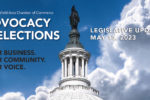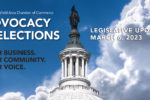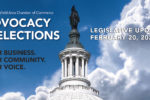Legislative Update: February 14, 2022
Here’s latest update from our Oregon State Chamber of Commerce (OSCC) legislative counsel, outlining what’s happening (OSCC Political Observations), activity on major issues, and what’s coming up. Any opinions expressed or implied are those of OSCC and do not necessarily reflect those of the Springfield Chamber or its representatives.
What’s Happening
We are 14 days into the 35-day 2022 legislative session. We hit a major deadline today with another major deadline to follow on Friday.
- Today – Original Committee ‘Work Session’ deadline (any bill not passed out of committee by COB is considered dead)
- Friday, February 18 – 2nd Chamber ‘Work Session’ posting deadline (any bill not posted for work session by COB is considered dead)
- Thursday, February 24th – 2nd Chamber ‘Work Session’ deadline (any bill not passed out of committee by COB is considered dead)
- Monday, March 7th – Constitutional Sine Die The pace of the 2022 legislative session really picked up last week, and by our estimation, about 75 percent of the approximately 275 bills have survived the first major deadlines.
February Revenue Forecast yields yet another major revenue haul
As if the 2022 legislature didn’t already have enough discretionary revenue to spend – about $2 billion leading up to the February session – the state economists on Wednesday gave legislators about a billion more reasons to celebrate.
The upshot – tax projections are now another $770 million above December estimates. All told, projected combined net General Fund and Lottery Resources are up a whopping $1.173 billion – a 4% increase from the December 2021 forecast that happened just sixty days ago. How absurd is it getting? Net General Fund and Lottery resources are up $2.72 billion (9.8%) from the 2021 Close-of-Session forecast upon which the state’s 2021-23 budget was based just seven months ago. A personal kicker of $964.2 million is now already projected for 2023.
Major Issues
HB 4079 Dies. From a tax and business competitiveness perspective, HB 4079 was the most alarming proposal of the session as it would levy a sales tax on “luxury” items and redistribute tax proceeds back to low-income Oregonians. HB 4079 failed to get a hearing and did not move prior to the deadlines.
Overtime wages for agriculture workers (HB 4002) continues to be the biggest labor debate of the 2022 session. HB 4002 would require agricultural employers to pay farmworkers overtime payments for all hours worked over 40 per week by 2027. Nearly all agriculture organizations oppose this legislation on grounds that commodity prices leave little margin for farmers and that increased labor costs cannot be absorbed.
OSCC stands with its partners in the agriculture sector. As we indicated last week, OSCC is watching HB 4141, which would phase out the use of petroleum-based diesel fuel. The objective is to set the stage for renewable diesel, which is widely recognized as a superior environmental fuel that is also well suited for diesel engines, but business organizations including OSCC are concerned that there will not be adequate supply of renewable diesel on the market when petroleum diesel is phased out. As of now, it appears HB 4141 will turn into a study that will further study the economics of phasing out petroleum diesel for renewable diesel.
The Governor’s Workforce bill – SB 1545 – is also of major consequence to business groups. It is a major $200 million investment in workforce programs. A previous version of the bill which focused workforce investments in health care, manufacturing and construction has been changed in new amendments which allow the investments to be made more broadly. The bill focuses on training supports for “priority populations” which include: (a) Communities of color; (b) Women; (c) Low-income communities; (d) Rural and frontier communities; (e) Veterans; (f) Persons with disabilities; (g) Incarcerated and formerly incarcerated individuals, (h) Members of Oregon’s nine federally recognized Indian tribes; and (i) Individuals who disproportionately experience discrimination in employment on the basis of age.
HB 4077 is scheduled for a public hearing and possible work session today. The bill in its current form would rename the Environmental Justice Task Force to the Environmental Justice Council (EJC), expand membership to broaden representation, and bring more state agencies under the jurisdiction of the council. The most important component of the bill, however, is the creation and funding of an environmental vulnerability mapping tool that would be used as a lens through which to examine environmental justice inequities and make future policy decisions. The governor’s office continues to treat this bill as one of their top priorities for the 2022 legislative session.
SB 1518 – REACH Code legislation – grants local government the authority to adopt alternative building codes known as REACH codes. The concept is scheduled for a work session in the Senate Energy & Environment Committee today, where it must move or die under today’s work session deadline. Given the priority placed on the bill by environmental groups, it is expected to advance and remain under consideration. OSCC will monitor SB 1518 for its potential impacts on local housing costs and existing and future production facilities and the ability of businesses to continue to use essential resources like natural gas.
Discover more from Springfield Bottom Line
Subscribe to get the latest posts sent to your email.




